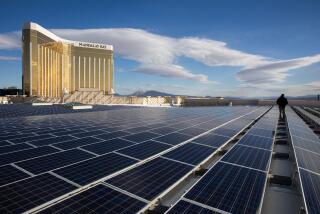Greener days for Idealab
- Share via
The hundreds of glass mirrors break the dusty field in Lancaster, a sea of silver in a landscape of brown.
When switched on for the first time today at an opening gala with investors, local politicians and others, they’ll make up the first operational solar tower energy facility in the United States.
They reflect the sun into a tower in the middle of the field, boiling water into steam that travels through pipes to power a turbine and create electricity. The plant, created by Pasadena company ESolar Inc., will be able to power 4,000 homes.
The strength of the small field of mirrors is surprising, but what might be more surprising is the technology’s source. It was established by Pasadena incubator Idealab, a 1996 creation of entrepreneur Bill Gross. Gross, whom Time magazine once called the “man with a billion dollar brain,” generated some big hits with GoTo.com, Internet Brands Inc. and Cooking.com, along with such misses as Eve.com and EToys.
Idealab, which has counted director Steven Spielberg and actor Michael Douglas among its backers, has been spreading its reach to the green technology sector.
In the last three years, it has created RayTracker Inc., a solar tracking solution for photovoltaic systems; Distributed World Power, which designs solar systems for developing countries; Aptera Motors, which designs fuel-efficient cars; and ESolar.
It is jumping into the environmental market as venture capital is flowing more into clean-tech companies. Investment in such firms shot up 73% in the second quarter from the previous quarter, according to Ernst & Young, and is expected to continue growing.
The percentage of clean-tech investments to total investor funding has increased to double digits over the last three years, said Doug Regnier, an Ernst & Young partner leading its Pacific Southwest clean-tech consulting business.
Energy “is probably the biggest opportunity of the century,” Gross said. “The world’s energy needs and the demand to make that clean energy is going to be a challenge and an opportunity for smart entrepreneurs.”
Though focused on computer software for two decades, Gross said he returned to his passion for solar energy in 2000 as power shortages loomed. The Caltech graduate bought the restaurant next door to Idealab and turned it into a machine shop, eventually running solar experiments on the roof. Idealab’s first clean-tech firm, Energy Innovations, was created in 2001 to convert solar applications for commercial use. Idealab hired 50 people in the next three years to work on such ideas as a fuel-saving car and a portable solar device for developing countries.
The concept for ESolar came about as Idealab engineers started thinking about ways to provide cost-efficient solar energy for utilities and realized that most solar panels in commercial use were too big to be cost-efficient.
“We tried to figure out the angle we could exploit where we can zig where other people zag,” Gross said.
They came up with what Gross calls an unorthodox plan: “Go small.” Rather than make giant solar panels, they sized them at one square meter. That made the panels easier to install, putting them together like Legos rather than erecting a giant solar facility.
The smaller mirrors also are able to be aimed more quickly at the boiler target, said Michael Liebelson, head of the low-carbon development group at NRG Energy Inc., which is building plants using ESolar technology. Idealab’s software expertise helped it devise a way to manipulate the mirrors for better precision, he said.
“ESolar has one of the most, if not the most, innovative solar thermal technologies out there,” Liebelson said.
The ESolar plant in Lancaster went up on the barren desert site in 18 months, said Lancaster Mayor R. Rex Parris. He’s trying to make his city a center for alternative energy. “For an alternative energy to go on the line in 18 months, it’s literally unheard of,” he said.
ESolar has lined up more than $130 million in investments from such firms as NRG, ACME Group, Google’s philanthropic arm and Oak Investment Partners.
For Gross, ESolar’s effort is a sign that the interest in solar is growing -- and that Idealab still has its knack for building companies and persuading venture capitalists to invest, even in a tough economy.
And it helps Gross regain a foothold after mutual fund giant T. Rowe Price and others sued him in 2002, alleging self-dealing and fraud, and shareholders bailed him out in 2006 after he failed to repay a $50-million personal loan.
“The biggest factor is when you’ve demonstrated that you can take a company from revenue to profit to successful exit,” he said. “That makes an investor comfortable that you can do it again.”
--
More to Read
Inside the business of entertainment
The Wide Shot brings you news, analysis and insights on everything from streaming wars to production — and what it all means for the future.
You may occasionally receive promotional content from the Los Angeles Times.











